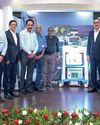
August 1st to 7th is globally observed as World Breastfeeding Week (WBW) every year. World Breastfeeding Week is coordinated by the World Alliance for Breastfeeding Action (WABA)1, a global network of individuals and organizations concerned with the protection, promotion and support of breastfeeding worldwide. WABA and breastfeeding advocates in over 175 countries worldwide celebrate the WBW with a specific theme every year; the WBW theme of this year is 'Step Up For Breastfeeding: Educate and Support'.
Despite all this awareness, it is unfortunate that what we see in reality is disheartening efforts and trends of breastfeeding. Over centuries, human milk is considered a complete nutrition package to nourish the newborn and is regarded as the nutritional gold standard for term infants. Breastfeeding has declined worldwide in recent years, as a result of urbanization, marketing of infant milk formulae and maternal employment outside the home.
A cause of worry
Studies in India have also shown a decline in breastfeeding trends. As per the international guidelines and the Indian Academy of Pediatrics Policy on Infant feeding, 'an ideal infant feeding comprises exclusive breast-feeding for six months followed by sequential addition of semi-solid and solid foods to complement (not replace) breast milk till the child is gradually able to eat normal family food (around one-two year).
Denne historien er fra September 2022-utgaven av Healthcare Radius.
Start din 7-dagers gratis prøveperiode på Magzter GOLD for å få tilgang til tusenvis av utvalgte premiumhistorier og 9000+ magasiner og aviser.
Allerede abonnent ? Logg på
Denne historien er fra September 2022-utgaven av Healthcare Radius.
Start din 7-dagers gratis prøveperiode på Magzter GOLD for å få tilgang til tusenvis av utvalgte premiumhistorier og 9000+ magasiner og aviser.
Allerede abonnent? Logg på

KIMSHEALTH launches electrophysiology lab with 3D mapping
'ENSITE X' is the first of its kind in Kerala and the third in India enabling precise identification, mapping, and targeting the abnormal electrical activities in the heart.

Molbio boosts Goa's healthcare system with CSR initiatives
The company has donated four state-of-the-art Advanced Life Support (ALS) ambulances and two hearse vans for National Highway emergencies

USV introduces affordable heart failure medication
This cost-effective option addresses the rising cases of heart failure in India, offering lifesaving care to millions of patients who need it the most.

City Imaging & Clinical Labs to expand services to 50 hospitals
The company is currently associated with 10 hospitals, providing comprehensive lab management services, including 24/7 in-house phlebotomy and lab testing.

Oncare raises $1 million in seed funding, to set up 10 units
Oncare has raised $1 million in a seed funding round led by Huddle Ventures. It plans to deploy the raised capital to expand its operations to 10 new centers.

Nutrabay forays into Ayurvedic supplements market with Shilajit
Nutrabay's aims at gaining market share from the existing ayurveda supplements market with a distinctive product proposition and education about the benefits of Shilajit.

INDIA'S PREPAREDNESS ON HEALTHCARE-ASSOCIATED INFECTIONS: A GROWING FOCUS ON PATIENT SAFETY
The country's diverse healthcare landscape necessitates a flexible and multifaceted approach to infection control that can be adapted to various settings and resource levels.

TRANSFORMING CARDIAC SURGERY: HOW AI IS REVOLUTIONIZING PATIENT CARE AND OUTCOMES
Dr. Swarup Swaraj Pal shared his insights on the current state and future prospects of AI in cardiac procedures.

BEYOND THE LAB: THE CRITICAL ROLE OF LOGISTICS IN INDIA'S PHARMACEUTICAL INDUSTRY
As India continues to expand its role in the global pharmaceutical market, the importance of a robust, reliable, and innovative logistics infrastructure cannot be overstated.

LIFESTYLE DISEASES IN CHILDREN: A WAKE-UP CALL FOR A HEALTHIER GENERATION
In today's fast-paced world, children face an unexpected enemy: lifestyle diseases. Conditions like obesity, Type 2 diabetes, and hypertension are now affecting our youth. What's causing this shift, and how can we combat it?